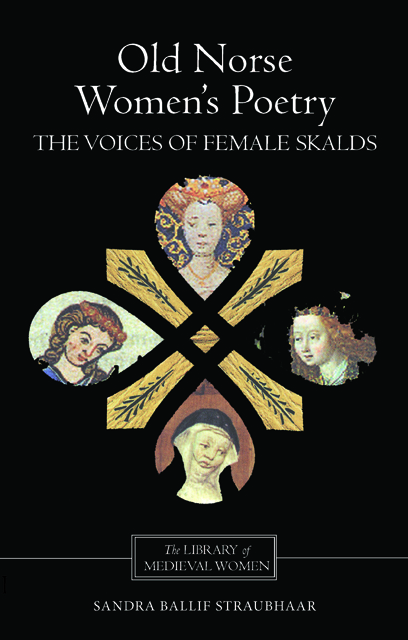Book contents
- Frontmatter
- Contents
- Foreword
- Abbreviations
- Introduction
- I. Real People, Real Poetry
- II. Quasi-Historical People and Poetry
- III. Visionary Women: Women’s Dream-Verse
- IV. Legendary Heroines
- V. Magic-Workers, Prophetesses, and Alien Maidens
- VI. Trollwomen
- Old Norse Literature Time Line
- Glossary of Personal Names
- Bibliography
- Index of Names
- Library of Medieval Women
Introduction
Published online by Cambridge University Press: 14 February 2023
- Frontmatter
- Contents
- Foreword
- Abbreviations
- Introduction
- I. Real People, Real Poetry
- II. Quasi-Historical People and Poetry
- III. Visionary Women: Women’s Dream-Verse
- IV. Legendary Heroines
- V. Magic-Workers, Prophetesses, and Alien Maidens
- VI. Trollwomen
- Old Norse Literature Time Line
- Glossary of Personal Names
- Bibliography
- Index of Names
- Library of Medieval Women
Summary
The scope of the present project
This book is an attempt to present, in one volume, a selection of notable Old Norse (Old Icelandic) poetry in which the voice of the speaking poet (skald, Icelandic skáld) is female. This poetry is attributed, in the manuscripts, to skalds from the ninth to the thirteenth century, as well as to numerous legendary figures impossible to verify or date. The poems are generally presented in the manuscripts within a prose narrative matrix, as speech acts performed by named women characters within that narrative. (This is in marked contrast to such conventions as those, common in some other European medieval traditions, in which, for example, a male poet adopts a woman’s voice for rhetorical purposes.) One can conclude, from the frequency of these female-voiced Old Norse poetic texts, that the Old Norse poetic production environment in the pre-manuscript era (however tentatively we might construct it or extrapolate about it) exhibited no particular hostility or disbelief in the face of the idea of women as composers and speakers of poetry.
It is very likely that the selection and preservation in manuscript of these Old Norse women’s texts have been further assisted by the relatively female-inclusive environments in which high-medieval Icelandic vernacular manuscripts were produced, environments which Guðrún P. Helgadóttir and Robert Kellogg have both investigated. Early-modern and modern editors have not been as favorable to women as the medieval ones were, however, with the rather astonishing result that this book represents the first published collection (that I know of) of all the poetry attributed to Old Norse women skalds.
A first perusal of the standard twentieth-century collections of skaldic poetry by Finnur Jónsson and Ernst Albin Kock is likely to lead the reader to conclude that the corpus of preserved poetry in Old Icelandic attributable to women poets (skáldkonur) is rather small. However, this first impression may change somewhat by tracing the verses in Finnur’s and Kock’s collections back to their original saga environments. It then becomes clear, for instance, that a sizeable amount of the dream-verse and prophetic fragments in Sturlunga saga was attributed to women, or that that pithy epigram labeled ‘Fragment’ in the modern editions was originally attributed to Bróka-Auðr in Laxdœla saga.
- Type
- Chapter
- Information
- Old Norse Women's PoetryThe Voices of Female Skalds, pp. 1 - 10Publisher: Boydell & BrewerPrint publication year: 2011



